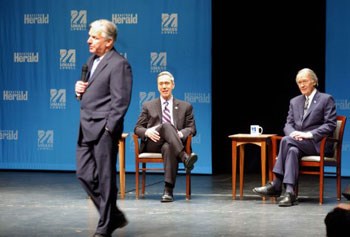
04/09/2013
Lowell Sun
By Katie Lannan
LOWELL -- The two Democratic U.S. Senate candidates started out in accord at Monday night's debate, condemning the effect of outside money in campaigns, but the common ground didn't last long beyond that first question.
U.S. Rep. Stephen Lynch of Boston downplayed where he diverges from Democratic party lines, while U.S. Rep. Ed Markey of Malden highlighted those instances, pointing out when his opponent had voted along with Republicans.
Taking questions from student panelists in a forum at UMass Lowell's Durgin Hall, the congressmen sparred over recently imposed mandatory spending cuts, abortion and health care.
Markey voted for health-care reform legislation, which Lynch opposed it.
"The vote for the Affordable Care Act is the proudest vote of my congressional career," Markey said. "And that's because, obviously, it's the fulfillment of the vision of Ted Kennedy and Barack Obama to provide health care to every child."
Lynch defended his vote, saying he supported instead an earlier "good act" that would not have taxed health care and would have provided a state-run insurance option in hopes that competition would lower rates.
"There's 27 states that have two or three insurance companies that control the entire market, so there's no competition there," he said.
Markey replied that Lynch was joined by all House Republicans in voting against the act.
"I just don't think he should be able to run away from his record on this," Markey said.
Lynch, who identifies himself as pro-life, said his record on abortion has been criticized by those who do not see him as "pro-life enough."
"I have said to them, 'I don't pretend to be an expert on church teaching, but I am an expert on what I believe,'" Lynch said. "What I do believe is that overturning Roe v. Wade doesn't end abortion."
Rather, Lynch said, banning abortion would drive women seeking the procedure to obtain it underground, in unsafe conditions.
Running with the endorsement of Planned Parenthood, Markey touted his own pro-choice position, a switch in ideology he made about 30 years ago.
"I came to the conclusion that that decision does belong with a woman," he said. "There was no single moment. It was an ongoing evolution."
Markey again attacked Lynch's record on the issue of the automatic spending cuts known as sequestration, a measure he described as "mindless" and said would devastate the state's research-and technology-driven economy.
"This sequester is cutting into the business plan of Massachusetts," he said.
Lynch said the alternative to voting for sequestration was allowing the country to default on its debt, an option he said would have had even worse consequences.
"With a lot of young people here, the $16.7 trillion we have in debt right now is on you," Lynch said to scattered applause. "It's on your backs."
The candidates were united in their appeal to an audience largely composed of college students. Both men said colleges needed to be made more affordable and discussed their own struggles to repay student loans.
They also agreed on the issue of same-sex marriage, with both saying they'd support a constitutional amendment making it legal nationwide.
On the issue of campaign funding from third-party groups, both candidates stood by their "People's Pledge" banning outside money from the race. Markey pointed out that it was a move the Republicans in the race
U.S. Rep. Stephen Lynch gestures during UMass Lowell Senate debate Monday.
Sun staff photos can be ordered by visiting our MyCapture site. had not made.
After the debate, each congressman told reporters he drew a sharp contrast between himself and his opponent.
Lynch said the differences between his and Markey's background, approaches and positions on the issues were "pretty strong."
Markey told the media that the contrast between the two was clearest on the issues of health care, abortion and sequestration.
"They're big issues," he said. "It's about the direction of the country."
The primaries are April 30, and the special election is set for June 25.
Three Republicans are also in the race. Two of them, former U.S. attorney Michael Sullivan and businessman Gabriel Gomez, faced off in a radio debate earlier Monday evening. The third Republican contender, state Rep. Daniel Winslow, did not participate.
